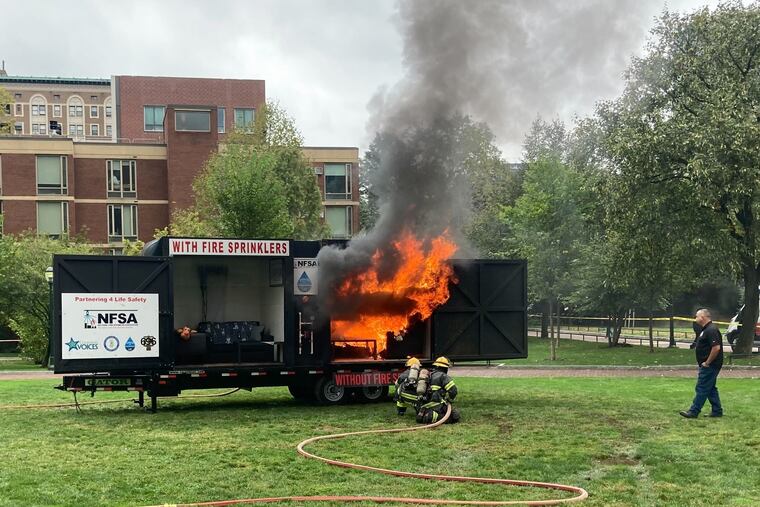A battle is brewing over a bill that would require sprinklers be added to older condos
Fire safety experts agree that sprinklered buildings are safer, but opponents to a new mandate say that requiring them in old buildings will be too expensive and disruptive to the lives of occupants.

A bill that requires the installation of sprinkler systems in older residential buildings taller than six stories became a hot topic again at the end of September.
As this session of City Council nears its end, fire safety groups and building trades unions are clashing with a coalition of condo owners and apartment associations that say they can’t afford such a costly mandate. But proponents of the bill argue that sprinklers are lifesaving devices, and that the new regulation is essential for public safety. The bill would cover pre-1991 residential high-rise buildings with the same mandate for automatic sprinklers that new apartment and condo buildings have had since that year.
Protesters flooded the plaza of the Municipal Services Building in response to a late September burn demonstration by the National Fire Sprinkler Association — meant to show the efficacy of sprinkler systems. The group, led by Andre Del Valle, vice president of government affairs at the Pennsylvania Apartment Association, claimed victory when the group abruptly canceled.
It would put “$20,000 to $50,000 relocation costs on the back of folks who have fixed incomes, who have retired, who have decided that this is their permanent home and now they’re being told they have to leave,” said Del Valle. “This is not going to happen to the city of Philadelphia.”
The Apartment Association estimates that 22,000 units, home to more than 26,000 residents, would be affected. It believes that 140 to 200 buildings would be affected by the legislation.
A burn demonstration took place at a larger health and safety event hosted last week by the University of Pennsylvania. Fires were set in two showcase rooms near the school’s Locust Walk, one outfitted with sprinklers, the other without. The sprinklered space’s flames were quickly put out, leaving intact, but sodden, furniture. The other was consumed by an inferno, leaving only a smoking and soaked ruin after firefighters blasted the conflagration with their hoses.
Fire Commissioner Adam Thiel was in attendance, and noted in a speech that he liked his “cheesesteak with whiz” and his “buildings with sprinklers.” After the demonstration he said that the Fire Department has no official position on City Council legislation, but that he is supportive of sprinklers generally.
“You saw the whole [sprinkler demonstration]. The difference? That’s my perspective. That’s science,” said Thiel.
What opponents and supporters say
The sprinkler mandate for historic residential buildings has been discussed since the beginning of Mayor Jim Kenney’s administration. Then-Councilmember Bobby Henon — the former political director of Local 98 of the International Brotherhood of Electrical Workers — championed it initially. Councilmember Mark Squilla picked up the effort after Henon stepped down from his committee leadership roles following his 2021 conviction. (Henon continued to argue in favor of the sprinkler bill.)
Opponents of the bill have attacked it as an unfunded mandate that would impose tens of thousands of dollars in costs and disrupt the lives of condo and apartment dwellers who would have to briefly move out of their units while the system was installed. They also argue that sprinklers could be tripped accidentally — causing water damage — and that modern concrete apartments are largely safe from fires spreading quickly unit to unit.
“These are buildings built of concrete, not combustibles like wood,” said Mark Levinson, general manager at the Philadelphian’s condo association. “We are partially sprinkled so if a fire department is there in five minutes that fire is going to be put out. The water damage alone from sprinklers will cause more damage than the fire.”
Opponents of the sprinkler bill also argue that it is a make-work bill for the Sprinkler Fitters Union. Former Councilmember Maria Quiñones Sánchez’s mayoral campaign ran online ads against the bill, saying it was a symptom of larger problems with Philadelphia politics.
Proponents of the legislation, which includes Sprinkler Fitters Local 692, say that although it would generate work for union members, their main interest is saving lives. They also say opponents are greatly exaggerating the costs, financial and otherwise.
“We’ve already done high-rise residential retrofits of buildings from before the codes went into effect,” said Wayne Miller, business manager of Local 692. “Nobody had to move out of their building. Nobody had to get an apartment. They’re putting a fear factor in everybody.”
A long burning conflict
After the One Meridian Plaza fire in 1991 — an inferno in a 38-story office building where three firefighters were killed — Council considered mandating sprinklers for all high-rise buildings. But back then, condo owners pushed back, and the idea was never enacted. All new post-1991 high-rise residential buildings have sprinklers by law.
More recently, a bill passed in 2018 mandated sprinklers in historic buildings after a conflagration on Chestnut Street in Old City, although opponents also pushed back against it as a make-work bill for the building trades unions.
For his part, Squilla said that he is considering amendments to the current bill. Earlier in the year, he suggested that sprinklers could just be installed in hallways and common areas. He also suggested that they could be placed in a home only after someone moved out, although it would be difficult to install a system on a unit-by-unit basis in a multifamily building.
But as the year nears its end, and the four-year legislative session concludes, the bill will need to advance soon if it is not to die, as its early 1990s predecessor did. Legislation that doesn’t pass by December would have to be reintroduced during Council’s next session.
“We’ve got to figure out amendments first,” said Squilla in late September. “We would have to do a hearing by the end of October.”